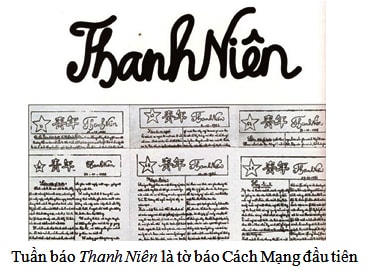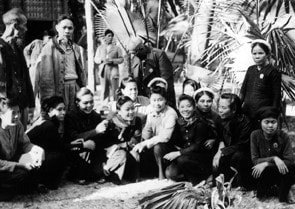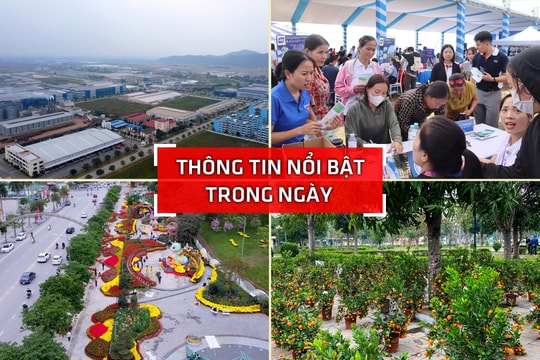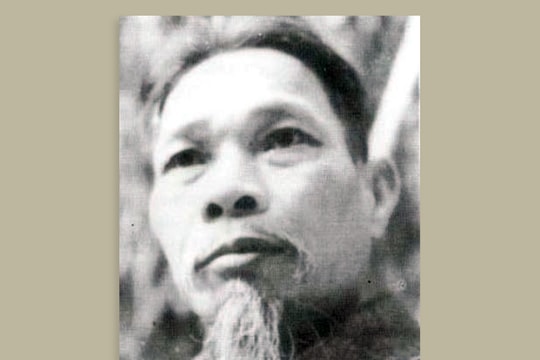Revolutionary activities of Ho Tung Mau
(Baonghean.vn) -While still active in Guangzhou, Ho Tung Mau used the pen name Ho Mong Tong to write articles for newspapers in China, denouncing colonial crimes, calling for the release of Phan Boi Chau from prison, and later became an active writer for Thanh Nien Newspaper.
 |
| Ho Tung Mau was an active writer for Thanh Nien newspaper at that time. |
Notably, when imprisoned in Vinh prison (Nghe An) and then Kon Tum prison, Ho Tung Mau played the role of founder, "editor-in-chief", "editorial secretary" of the "oral newspaper". After the editorial board met, they chose the topic, set up columns and then assigned each person to think carefully, "write" and memorize in order to wait for the time to present.
“The article was not written on paper but was carefully thought out in the mind, so not only was the content concise, but the form was also quite neat and literary”, “the newspaper did not need to be written or printed, but it reached readers very quickly and sensitively”, “it fulfilled its mission of encouraging the spirit and maintaining the revolutionary will of communist soldiers in prison”.
In addition, Ho Tung Mau also composed "oral novels" titled "Giọt huyet hồng" and "Tuc thuat huyet hồng" to read to fellow prisoners, to encourage each other to maintain the loyalty and indomitability of communists. In Kon Tum prison, Ho Tung Mau also taught politics and Chinese, initiated many cultural and artistic activities, composed a number of valuable poems such as "Tin tin" and "Tam mo kiet si"; established "Tao dan Association" to use the form of composing and commenting on poetry to encourage and educate communist prisoners, "contributing to making the will of political prisoners as hard as steel and as steadfast as copper".
Since our Party launched the anti-Japanese movement to save the country, Ho Tung Mau and a number of political prisoners escaped from Tra Khe prison to Binh Dinh province, were welcomed by the Party organization and Viet Minh there, and returned to Quynh Doi village in March 1945. The puppet government of Tran Trong Kim immediately invited Ho Tung Mau to be a political advisor but was resolutely refused.
He actively propagated and mobilized people to help each other to relieve hunger, joined the National Salvation Association, supported the revolution, and assigned his son, Ho My Xuyen, to join the Uprising Committee of Quynh Luu district. Partly thanks to that, Quynh Luu district gained the earliest government in Nghe An province during the August Revolution of 1945.
When our Party was preparing to issue the order for a General Uprising, Ho Tung Mau and a number of other comrades were mobilized to strengthen and lead the Central Region Party Committee, prepare political and armed forces to move towards a General Uprising to seize power, contributing significantly to the victory of the uprising to seize power in the provincial capitals of Nghe An, Ha Tinh, Quang Binh, Quang Tri, and Thua Thien - Hue.
 |
| Uncle Ho and Ho Tung Mau with female delegates attending the 2nd National Party Congress (March 1951). |
The August Revolution of 1945 was successful. We actively fought against hunger, illiteracy and foreign invaders, and enthusiastically built a new life. However, in some localities, mistakes were made, such as cutting down ancient trees in the village to sell, using the money to forge knives, spears and machetes. Some places in Nghe An even removed the altars in the temple and communal house, not allowing people to worship in order to implement mass education. Some places even destroyed temples, pagodas and Buddha statues...
In Do Luong district (Nghe An), Phat Ke pagoda - an ancient pagoda built during the Ly dynasty was destroyed. Ho Tung Mau commented: "Revolution is not like that. Not everything old must be destroyed to make new. Revolution must protect the architectural and sculptural works left by our ancestors. Revolution must respect the people's freedom of belief."
In Quynh Luu district, Cho Pagoda - a pagoda built during the Mac Dynasty - was destroyed, and the Buddha statue and other sacrificial objects were moved to another place to make it the commune headquarters; in some places, the village's kapok and banyan trees, planted since the 14th century, were cut down to get wood to make desks and chairs for students.
Ho Tung Mau heard the story and immediately reminded: “Why did you destroy the pagoda? This is the cultural heritage of our ancestors, it beautifies the village. You destroy it and lose the cultural heritage, and it will not be able to be rebuilt later. Moreover, how will the neighboring villages understand it? People will doubt the revolution. Doing this is a leftist crime. If cholera kills some people, then leftist disease kills the entire revolutionary cause.”
Before that, during the revolutionary movement of 1930-1931, hearing the news that in his hometown there was a slogan: "Intellectuals, rich, landowners, and tyrants, uproot and eradicate", Ho Tung Mau was very heartbroken. Later, he said: "Hearing that news, I was very worried. Who would advocate such a policy? It would be divisive. Revolution requires unity. Fortunately, that policy was only launched in a short time, and our Party was able to promptly correct and amend it."
Dr. Le Duc Hoang
Department of Propaganda, Central Propaganda Department




